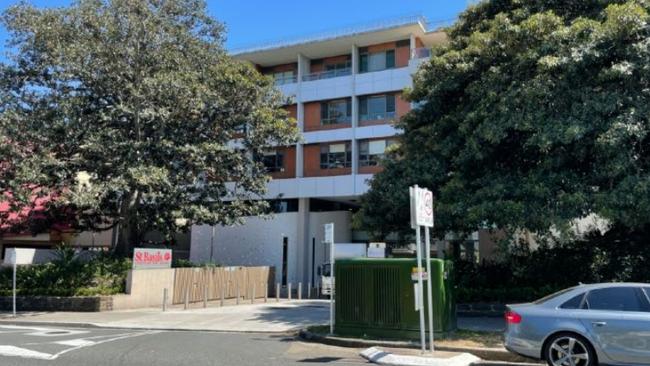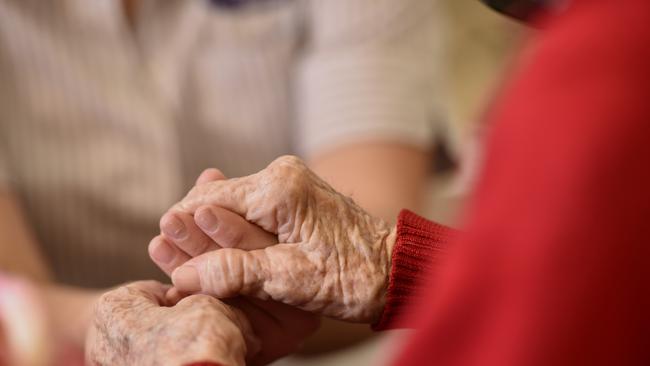St Basil’s Randwick: aged care home fails quality standards, ordered to undertake staff training
An aged care home which failed inspections so comprehensively that Commonwealth funding was pulled has now been plunged into a Covid crisis.
Southern Courier
Don't miss out on the headlines from Southern Courier. Followed categories will be added to My News.
An eastern suburbs aged care home is on alert after a staff member tested positive for Covid-19.
St Basil’s aged care in Randwick has confirmed an employee has been stood-down and is self isolating after returning a positive result for the virus in August.
It comes after an audit by the Aged Care Quality and Safety Commission in June found the facility was unable to demonstrate that it had implemented an effective Covid-19 outbreak management plan.
The staff case was listed in last week’s Federal Health register of nursing homes where Covid-19 cases have been confirmed.
In a statement, the facility’s acting chief executive Spiro Stavis said a Covid-19 management plan has been activated.

“The affected staff member is fully vaccinated and has been stood down whilst self-isolating. We wish her well during this difficult time,” he said.
“Staff who are considered close contacts have also been stood down to self-isolate and be tested regularly.
“We understand that this is an unsettling time for our cherished residents, their families and our dedicated staff.
“All residents of our home and their representatives have been advised of the situation at hand, and we are committed to keeping them closely informed.”
The home said testing of all residents and staff is being undertaken frequently as directed by NSW Health.
In August the Southern Courier revealed Australia’s aged care quality watchdog had taken compliance action against the home after failing a string of quality standards including the clinic care of residents.
St Basil’s Home in Randwick was ordered to hire an external advisor and conduct staff training to lift its standards following an inspection by the Aged Care Quality and Safety Commission (ACQSC) in June.
The inspection found the home was non-compliant with 35 of the 42 key benchmarks the commission uses to assess the wellbeing of aged care residents including noncompliance with the safe and effective personal care of residents and effective management of high-impact risks.
The facility, which describes itself as offering the highest standards of care and “prides itself on making sure our residents settle back and feel at home”, was also non-compliant with consumer dignity and choice, support for daily living, and systems for handling feedback and complaints.
As part of the compliance action, the facility will not be able to receive Commonwealth subsidies for any new care recipients for six months, and must also participate in fortnightly teleconferences with the ACQSC and complete fortnightly reports outlining the facility’s steps towards improvement.
A report detailing the litany of noncompliance at the home included deficits in the review of care and services for residents in relation to falls management, deteriorating mental health and pain.

A care plan for one resident was not adequately reviewed or updated to reflect their needs in relation to the administration of medication, and did not include information relating to the resident’s mobility, pain management and pressure injuries. Deficits were also found in the diabetic monitoring for another resident.
Inspectors found while the service had written materials about best practice care delivery, it was not always applied and key information on a psychotropic register such as when the medication was to be reviewed and whether consent had been obtained were missing.
The ACQSC said it was told by staff there had been “multiple changes in managers in recent times with each adopting a different approach” to minimising the use of psychotropic medications.
Pressure injuries in other residents had not been identified, treated and monitored to best practice standards and this resulted in a “significant impact upon their health and wellbeing”, the ACQSC said.
“For one consumer who requires re-positioning a pressure injury was not identified or reported until it had reached an advanced stage and for another consumer a pressure injury was incorrectly classified,” the report added.
The audit also found the service was unable to demonstrate that it had implemented an effective Covid-19 outbreak management plan, and there was a high use of agency staff with residents often waiting for extended periods to have their requests for assistance attended to.
Other grounds of noncompliance included inadequate food with inspectors finding lunch services in a dementia unit consisted of puree with large amounts of gravy. One resident at the home described the food as “tasteless”.
Residents also gave mixed feedback as to whether they received the personal care and clinical care that was “safe and right for them”.
The inspectors noted the home’s demographic was largely Greek and the facility was part of the Greek Orthodox Archdiocese of Australia, however the service was unable to demonstrate staff had access to resources or information to assist communicating with residents who do not understand English.
In a statement, St Basil’s Homes acting chief executive Spiro Stavis said the facility was committed to addressing the areas of noncompliance.
“At St Basil’s Homes NSW/ACT Randwick we’ve begun introducing adjustments to close the gaps identified across the aged care quality standards,” he said.
“It has been a challenging period in the aged care sector, and we understand that there is significant trust placed in us to meet resident expectations and those of the regulatory system.
“This is not an outcome that we wanted for our home or our residents because at St Basil’s Homes NSW/ACT we pride ourselves on providing quality services under the values we hold dear, for the health, dignity and safety of our cherished residents.”
Mr Stavis said the facility has appointed Anchor Excellence as advisors to participate in fortnightly reporting and teleconferences with the ACQSC along with supporting the home’s leadership group to address the sanction issues, and supporting onsite clinical and governance operations.
“Residents and their representatives .... have been very responsive and supportive in assisting us to make improvements to plans relating to residents’ individual care. It is encouraging to have their support in improving our home,” he said.





